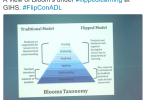--Originally published at Flipping My Primary Classroom

Dear Reader,
I hope you will permit me to share an article that I wrote recently for ETS magazine. Please find the link here. Alternatively - read on below!
The Flipped Classroom: A Paradigm Shift
A change is here. It is not coming. It is here. It has arrived. And like the wind, teachers can feel it on their skin, and in some classrooms. The way teachers have taught for the last 100 years is undergoing a significant transformation. This article is about a paradigm shift.
Readers have almost certainly heard about the flipped classroom. It is a concept that has been in the educational sphere for at least five years now. At its most basic definition, the flipped classroom is this: the lessons are viewed at home and the homework is done in school. Hence, the standard classwork/homework pattern is ‘flipped’ or inverted. There are more sophisticated and better definitions than this, but that is for another article.
What effect does this homework/classwork shift have on the traditional paradigm of teaching? How does creating video lectures for students open up a classroom to be more engaging in homework-style activities? What sort of effect does this have on the classroom? The answer is, a significant effect.
In the flipped classroom, a paradigm that has remained unchanged for around 2,000 years is transformed in an instant. No longer is the teacher out the front, dispensing his or her wisdom and intelligence, in quantifiable packets, at a prearranged times, at a set pace and at a certain point in the unit. No longer do students have to be there, in the classroom, at that place, at that time, to receive teacher-dispensed packets of wisdom and content. The age of teaching from the front of the room, like drawing on rock with charcoal, or writing on blackboard with chalk, or scribing on an interactive whiteboard, are over. The teacher is no longer the ‘sage on the stage’. Rather, the teacher is the ‘guide by the side’. This is not a catchy phrase – it is a literal description.
The teaching content is available 24 hours a day, 7 days a week, when the student is ready. It is available at any place and on any device. It is available at the student’s preferred pace, and can be watched and re-watched as many times as is necessary. The content can also be fast-forwarded if the student deems it necessary. Student agency over student learning has been increased. Students are no longer passive recipients of the teachers’ intelligence or wisdom. Rather, they are active hunters for information they require in order to master or pass elements of the assessment.
For teachers who like to lecture from the front and have students hanging on their every word, it may be time to pursue a career in politics, because in schools, the soapbox has been smashed by the digital revolution and educators must move with the times.
An uncomfortable truth is this: if a teacher can be replaced by a YouTube video, perhaps he or she should be. Everyone may have noticed fewer cashiers in supermarkets lately. They have been replaced by the rising use of ‘self-service’ shopping machines. The same sort of thing is happening in education right now. Developing technology is driving a paradigm shift.
Obviously, some lessons require person-to-person interaction; discussions for example, or debates. A video cannot provide much in the way of empathy, or a sympathetic ear to a distraught student. But any lesson that is content driven can be recorded, uploaded and available permanently for students at their convenience.
Educators must change, or else a change will be foisted upon them. It is not realistic to say that teachers will not be teachers anymore. Only a trained and present teacher can effectively maximise, mediate and moderate online instruction. At this point, only teachers can guide students to different resources, or simply help their students who are stuck on a particular problem – though ‘adaptive learning’ may speak to this area in the future.
Educators must change. If they do not change, or grow, they will literally become redundant. The wind is blowing. It is time to set the sails.




